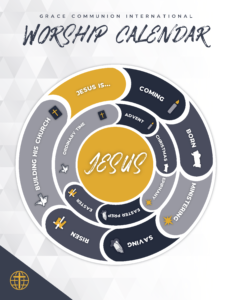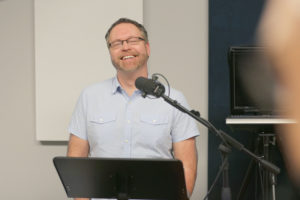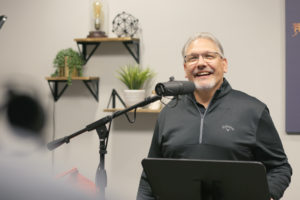Psalm 105:1-11, 45b • Genesis 29:15-28 • Romans 8:26-39 • Matthew 13:31-33, 44-52
The theme this week is God’s promise story. Our God has entered our story and keeps his promises through to the end. Genesis 29 tells the story of a broken promise by a person and a kept promise by God that brought Jacob and Rachel together, continuing the lineage of Israel (and Christ). Psalm 105 is a hymn of praise reiterating God’s covenant with his people. Matthew 13 talks about the in-breaking of God’s promised kingdom into the world through Christ. Our sermon, “All Things Together” looks at the promises of Romans 8. The crescendo promise is that God works all things together to make us like Christ.
“All Things Together”
Romans 8:26-39 ESV
Read or have someone read Romans 8:26-39 prior to the sermon.
We know the story of Abraham and Isaac. Abraham had been waiting for years—and made his share of mistakes along the way—to be given a child of promise. Isaac was the chosen one through whom God would finally bring his promise to Abraham to fulfillment: he would make him a great nation. Just in time, when all hope seemed lost, God made good on his promise.
And then he asked Abraham to sacrifice the boy! The barbaric tribes around them practiced human sacrifice, but that was one thing that distinguished the God of Abraham. Followers of God sacrificed animals, but the sacrifice of humans—the image-bearers of God—was never done. It was forbidden.
Think of the trust that Isaac displayed. He was a young man, more able-bodied than his father, who was an elderly man by this point. For three days they travelled— Abraham, Isaac, and a few servants.
Finally, they see the mountain where Abraham will make a sacrifice. Isaac finally points out the obvious, “Dad, we have wood and fire, but we don’t have a lamb for the offering. What’s the deal?”
I can’t help but wonder if Abraham was barely able to say the words, “God will provide a sacrifice.” Isaac doesn’t know what’s going on, but he follows along. Abraham builds the altar, still no lamb for the sacrifice. They put the wood up on the altar—still no sacrifice. He gets the rope to bind the animal—still nothing.
Here we see the willingness, the trust, of the relationship of father and son. Isaac lets himself be bound, lays down on the wood, knowing what happens to sacrifices. He’s seen his father do this a hundred times—a frightened innocent animal, a raised knife, a quick movement and then suddenly silence. The heavy smell of blood. He closes his eyes.
Suddenly light—a flash, like someone flipped on the lights when you’re in a deep sleep. A voice from somewhere all around them. He opens his eyes and his father is there, collapsed with relief and weeping. They hear the sound of a ram caught in the bushes next to them.
The story of Abraham and Isaac. God provided a ram in the last moment to be the sacrifice that Isaac was meant to be. God stopped Abraham’s hand as he was about to make the ultimate sacrifice.

Centuries later, another sacrifice was being made. There was wood, there was rope, and there was a lamb, but not one on four legs. There was pain, blood, and a cry of abandonment we can’t even begin to understand. It was as though the heart of the universe was broken.
The hammer is raised, and no one stops it. This time there is no ram caught in the brambles to be a replacement sacrifice. A lonely cry echoes through the air, and there is the smell of blood and the silence of death.
Paul brings these two events together when he says:
He who did not spare his own Son, but gave him up for us all—how will he not also, along with him, graciously give us all things? (Romans 8:32 ESV)
I believe this leads to a great truth: it hurts to really forgive. To forgive someone, to ultimately let their offense go, hurts you. In the end, it will heal you, but in that moment all of you is crying out for justice. This person insulted me! This person left me! They have to hurt for it! Forgiving them means we let that crying out go, it means we choose not to hold onto our need to see justice done. We let them go, and that isn’t easy to do—it’s painful.
We offended God, we sinned and broke our relationship with him. Yet instead of raining that justice down on us, instead of taking it out on us, he took it out on himself. It hurt him to forgive us. This is what happened in Christ.
He who did not spare his own Son, but gave him up for us all—how will he not also, along with him, graciously give us all things?” (Romans 8:32 ESV)
In the midst of that suffering, that hurt to forgive, Jesus groaned, “Eloi, Eloi….”
It is interesting that today’s Scripture reading begins with a reference to groaning.
Likewise the Spirit helps us in our weakness. For we do not know what to pray for as we ought, but the Spirit himself intercedes for us with groanings too deep for words. (Romans 8:26 ESV)
Creation groans, we groan, the Spirit groans—what’s the promise there? That God is with us, groaning as we are. He hasn’t left us alone with just the vague, abstract promise of heaven—he walks with us, his presence is with us.
C.S. Lewis describes it beautifully in his book Mere Christianity. He talks about how God conforms us to the image of Christ, as he calls it, “dressing up as Christ”:
You see what is happening. The Christ Himself, the Son of God who is man (just like you) and God (just like His Father) is actually at your side and is already at that moment beginning to turn your pretence into a reality. This is not merely a fancy way of saying that your conscience is telling you what to do. If you simply ask your conscience, you get one result; if you remember that you are dressing up as Christ, you get a different one…
The real Son of God is at your side. He is beginning to turn you into the same kind of thing as Himself. He is beginning, so to speak, to ‘inject’ His kind of life and thought into you; beginning to turn the tin soldier into a live man. The part of you that does not like it is the part that is still tin. (Mere Christianity, Book IV, Chapter 7)
So, here we are continuing to be in the world, continuing to be in the time between the times. And in some way the world itself is here as well—droughts and storms, death and decay. All of creation has been affected by sin; touched by its corruption.
The promise, the great release of Romans 8, is that this painful, isolated time is no longer meaningless, no longer lonely. As creation groans, as we groan, so the Spirit groans with us. God has not taken us out of our suffering but has joined us in it. Just as Christ was resurrected, so will we be resurrected, and so will the universe. Yet in this time of decay and death, even then he is with us.
God is conforming us into the image of Christ. He has taken us into his program—as Lewis says it, “He is beginning to turn the tin soldier into a live man.”
One of the most famous verses in this passage here is 8:28. Most of us have memories of this on cross-stitch samplers at grandma’s house:
And we know that in all things God works for the good of those who love him, who have been called according to his purpose. (Romans 8:28 ESV)
What is this “good” Paul is talking about? Does this mean that your hardships now are going to help you get worldly success in the future? Does this mean that if you get robbed today, you’ll find a million dollars in a suitcase tomorrow? No! “The good,” as Paul writes it, means the good of being transformed into the image of Christ. You might get robbed today, and God will turn even that into good by helping you not to be attached to material things or put your faith in money, but to be more like Jesus.
Painful at times maybe, but this conforming is ultimately our healing. Have you ever seen this poem before? Another cross-stitch sampler for you:
I asked for strength and God gave me difficulties to make me strong.
I asked for wisdom and God gave me problems to solve.
I asked for prosperity and God gave me brawn and brains to work.
I asked for courage and God gave me dangers to overcome.
I asked for patience and God placed me in situations where I was forced to wait.
I asked for love and God gave me troubled people to help.
I asked for favors and God gave me opportunities.
I asked for everything so I could enjoy life.
Instead, He gave me life so I could enjoy everything.
I received nothing I wanted, I received everything I needed.
When we are conformed to the image of Christ, when we come at life the way he does, life is as it was meant to be. Through the Holy Spirit’s involvement in our lives, God is conforming us to live life as it was meant to be lived.
This is the promise of Romans 8, that we have been adopted into God’s inheritance, and invited into his program. Our old enemies of decay and corruption—even Satan himself—can’t remove us from God’s gracious leading.
The Roman church Paul was writing to was undergoing persecution. They were being socially ostracized and financially pressured, and sometimes worse. Paul wrote to encourage them that all those things—all these stresses they face, could not separate them from God’s love and God’s program of redemption.
That is the crescendo at the end of Romans 8. Paul has sketched out the fact that God himself through the Holy Spirit is in us. We are justified, awaiting resurrection, and in this time, God is forming the image of Christ in us. All of creation waits with us, the entire universe touched and corrupted by sin—groaning.
The final word here is that God’s program will not fail. Nothing will get between us and the love of God—his work in our lives. Nothing is lost! Every detail of our lives can be used by God to redeem us, to bring us further into relationship with him. All of our pain, our fear, our loss, our brokenness can be redeemed, and nothing can get in the way of that happening!
For I am sure that neither death nor life, neither angels nor rulers, nor things present nor things to come, nor powers, nor height nor depth, nor anything else in all creation, will be able to separate us from the love of God in Christ Jesus our Lord. (Romans 8:38-39 ESV)
There’s a lot going on here. It’s one of Paul’s signature lists. “Neither height nor depth” may refer to some astrological symbols that people believed in at the time. It’s Paul’s way of saying fate—specifically people’s superstitions about fate—cannot separate us from the love of God. Even the way things are “supposed” to work can be overturned by his miraculous love.
A lot of this list is pretty abstract to me. I’ve never seen angels and demons, I don’t believe in astrology, I don’t know what it’s like to experience this kind of extreme persecution—some of those things may be more concrete for some of you than they are for me. The one word that has always stayed with me in this passage is LIFE.
“Neither death nor LIFE.” Life seems like it is separating us from the love of God a lot of the time, isn’t it? Friendships lost, kids growing up and leaving home, losing our parents, mental illness, traffic jams, bodies breaking down—yes, life seems to be separating us from the love of God.
No one knew this better than Paul. Paul’s life, especially after his ministry started, was full of these life circumstances. Even as he wrote these words, he seemed to sense that life was going to be very hard for him soon. Soon he would go to Rome, and it might be his last trip, his final journey.
A decade later, the last words Paul wrote are in the end of 2 Timothy. These are the last recorded words we have from Paul. Listen to these words, think of Paul writing them in his prison cell as they’re sharpening the sword for his execution.
Do your best to come to me quickly, for Demas, because he loved this world, has deserted me and has gone to Thessalonica. Crescens has gone to Galatia, and Titus to Dalmatia. Only Luke is with me. Get Mark and bring him with you, because he is helpful to me in my ministry. … When you come, bring the cloak that I left with Carpus at Troas, and my scrolls, especially the parchments. … The Lord will rescue me from every evil attack and will bring me safely to his heavenly kingdom. To him be glory for ever and ever. Amen. … Do your best to get here before winter. (2 Timothy 4:9-11, 13, 18, 21)
You can hear the plea. “Come to me, my friend, come to me… remember to give this to someone, to bring this with you… please come to me soon.”
And yet there is at the end a word of triumph: “The Lord will rescue me from every evil deed and bring me safely into his heavenly kingdom. To him be the glory forever and ever. Amen.” All of the harsh, jagged details of his life and his ministry—none of them were lost! None of the pain, none of the losses, none of the loneliness—NONE of it separated him from God’s gracious plan!
Paul could have had it a lot easier—gotten a lot more done, been more effective in our minds—if he hadn’t spent all that time in prison. Instead, he was imprisoned, beaten, kept from seeing most of the people he had pastored. Yet nothing is lost! God used all that happened to him to shape him into who he was, and to shape the church into what it became.
He lived and died knowing that God’s will was being done, that the Lord was with him, that he was right in the middle of God’s hand. And so are we.
Questions for Speaking of Life: “Slow-Release Truth”
- Have you ever heard a great object lesson that stayed with you for a long time? (i.e. “life is like a box of chocolates” or “the economy works like a waterfall”). Why did it stay with you?
- Have you ever found it frustrating that Jesus taught in parables? Why do you think he did?
Questions for Sermon: “All Things Together”
- We talked about C.S. Lewis’ famous quote on “dressing up as Christ” in which Jesus is pointing out things in our lives that need to change as we become more aware of him. Have you ever had this experience? Was it painful or liberating or both?
- Is it a surprise when we read the famous verse, rendered in the NIV as “God works all things together for the good of those who seek him” (Romans 8:28), that it refers to all things shaping us into the image of Christ? That “the good” doesn’t mean our understanding of good, but God’s understanding? How does that change your understanding of this verse?
- Romans 8:38 reminds us that “neither death nor life” can separate us from God’s love. Have you ever felt that life itself might separate you from God? Or that you’ve been abandoned by God in life? If your faith was restored, how did that happen?
Quote to Ponder:
“Human beings are creatures with a mystery in their hearts that is bigger than themselves.” ~Hans Urs Von Balthasar, theologian




 By Elizabeth Mullins, GC Hickory Love Avenue Champion
By Elizabeth Mullins, GC Hickory Love Avenue Champion






